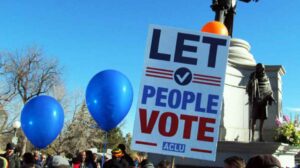
In November 2018, over 5 million Floridians voted yes to the petition-based amendment that restored voting rights to 1.4 million ex-felons.
Just six months after the amendment passed, Governor Ron Desantis (R) signed Senate Bill 7066 into law, requiring convicted felons “to complete all payments of restitution or any fines, fees, or costs resulting from the conviction,” before they are allowed to vote.
Desantis even tweeted about Florida’s courts allowing the requirement of fees, calling voting a privilege.
Many Twitter users were quick to correct Desantis by noting that voting isn’t a privilege for Americans, but a right guaranteed in the U.S Constitution regardless if a person has been incarcerated.
When amendment 4 was put on the ballot, many people feared that there would still be hurdles ex-felons had to cross before they were actually able to exercise their rights.
Immediately after Senate Bill 7066 was passed, three organizations, including the NAACP, filed lawsuits against it arguing that it is unconstitutional and unnecessary.
These tactics and loopholes politicians like Desantis are implementing mirror fundamental tactics used during the Jim Crow Era to discourage Black citizens from voting.
What is it about a fair voting system for all constituents that scares politicians like Desantis? Do they think that if everyone’s voices are heard, they might be voted out?
Because of mass incarceration, there are entire demographics that are disenfranchised yet in Census’ votes they’re being counted in areas where they’re incarcerated versus where they’re from. This is known as prison gerrymandering.
Prison gerrymandering gives politicians in predominantly rural/ White areas the advantage of having district lines drawn in their favor as opposed to the more urban/ minority-raced areas where the majority of the prisoners come from.
As free citizens, I believe we have a communal duty to advocate on behalf of those incarcerated and do our part to eradicate voter suppression and corruption.
The 2020 election will be monumental for our nation, and it’s important that a swing state like Florida is as fair-balanced and equal as possible.
While there are teams of litigators fighting to reverse 7066, there is still work to be done from everyday Florida citizens.
Simply calling your representatives and emphasizing the constitutional value of “one person, one vote” can help show your support for those serving time. By holding local and state politicians accountable for their actions, it puts the power back in the people’s hands.
Prison and criminal justice reform is a passion I hold dear to my heart because we oftentimes forget about those who are incarcerated, and our legislative system takes advantage of that and abuses their power.
As the primary and general election draws near, remember not only yourself but also those who aren’t able to represent themselves.